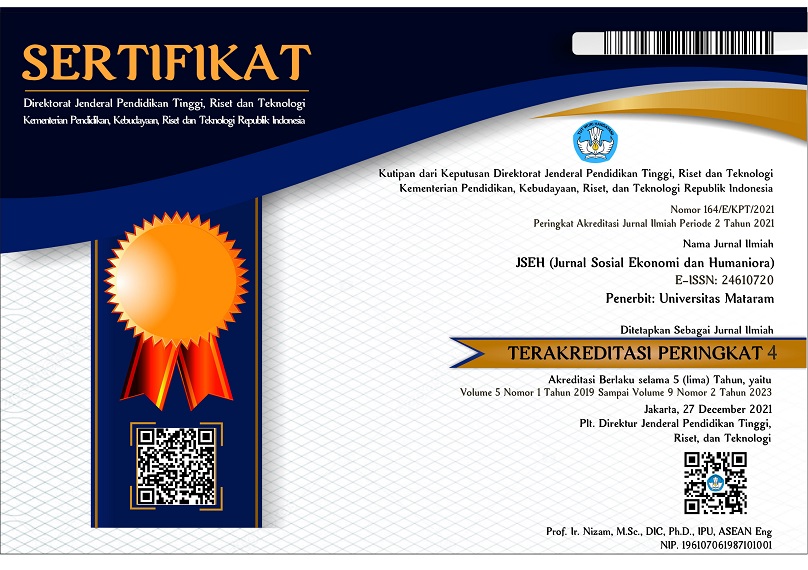Fuzzy-Set Qualitative Comparative Analysis: Studi Kasus Index Kebahagiaan di Indonesia Tahun 2021
DOI:
https://doi.org/10.29303/jseh.v9i1.174Keywords:
Fuzzy-Set QCA, HappinessAbstract
The happiness index provides a subjective picture of the level of community welfare. The purpose of this study is to compare the level of happiness in provinces throughout Indonesia in 2021. The analytical method used is Fuzzy-set Qualitatite Comparative Analysis with the help of fsQCA software. The results of the research through Truth Table Analysis show that the model formed is sufficient to state that the existing condition data is able to explain the outcome of happiness. Poverty, HDI, Unemployment Rate, and Gini Ratio meet the requirements of adequacy (sufficient) to explain the outcome.
References
Ariyani, N. (2021). Faktor - Faktor yang Mempengaruhi Partisipasi Pemangku Kepentingan pada Pengembangan Kawasan Wisata Kedung Ombo. Jurnal Pariwisata Terapan, 4(2), 147. https://doi.org/10.22146/jpt.60678
Badan Pusat Statistik. (2021). Indeks Kebahagiaan 2021. badan pusat statistik.
DiMaria, C. H., Peroni, C., & Sarracino, F. (2020). Happiness Matters: Productivity Gains from Subjective Well-Being. Journal of Happiness Studies, 21(1), 139–160. https://doi.org/10.1007/s10902-019-00074-1
García-Ramos, R., & Díaz, B. D. (2021). Board of directors structure and firm financial performance: A qualitative comparative analysis. Long Range Planning, 54(6). https://doi.org/10.1016/j.lrp.2020.102017
Huang, J. (2019). Income Inequality, Distributive Justice Beliefs, and Happiness in China: Evidence from a Nationwide Survey. Social Indicators Research, 142(1), 83–105. https://doi.org/10.1007/s11205-018-1905-4
Indra Andrianto, & Iskandar, D. A. (2020). PEMBANGUNAN DAERAH DALAM KEMISKINAN DAN KONVERGENSI/ DIVERGENSI WILAYAH. INPRESS JURNAL LITBANG SUKOWATI, 4(1), 11–23. http://www.tjyybjb.ac.cn/CN/article/downloadArticleFile.do?attachType=PDF&id=9987
Jain, M., Sharma, G. D., & Mahendru, M. (2019). Can i sustain my happiness? A review, critique and research agenda for economics of happiness. Sustainability (Switzerland), 11(22), 1–36. https://doi.org/10.3390/su11226375
Luo, J. (2020). A Pecuniary Explanation for the Heterogeneous Effects of Unemployment on Happiness. Journal of Happiness Studies, 21(7), 2603–2628. https://doi.org/10.1007/s10902-019-00198-4
Mateu, P., Vásquez, E., Zúñiga, J., & Ibáñez, F. (2020). Happiness and poverty in the very poor Peru: measurement improvements and a consistent relationship. Quality and Quantity, 54(3), 1075–1094. https://doi.org/10.1007/s11135-020-00974-y
Organization for Economic Co-operation and Development (OECD). (2019). Better Life Index: Definition and metadata. May, 1–8. https://www.oecd.org/statistics/OECD-Better-Life-Index-definitions-2019.pdf
Pappas, I. O., & Woodside, A. G. (2021). Fuzzy-set Qualitative Comparative Analysis (fsQCA): Guidelines for research practice in Information Systems and marketing. International Journal of Information Management, 58(June). https://doi.org/10.1016/j.ijinfomgt.2021.102310
Suparta, I. W., & Malia, R. (2020). Analisis Komparasi Hapiness Index 5 Negara di Asean. Jurnal Ekonomi Pembangunan, 9(2), 56–65. https://doi.org/10.23960/jep.v9i2.79
Vikash, V. (2019). Human Development Index and Gross National Happiness Indices: A Conceptual Study. Advances In Management, 12(1), 62–63. https://www.worldresearchersassociations.com/mngmntcurrissue/10.pdf
Yifan, G., & Bei, L. (2021). Influencing Factors and Multiple Paths of Construction Ability of Digital Government: Qualitative Comparative Analysis Based on 31 Chinese Provinces. Procedia Computer Science, 199, 1213–1220. https://doi.org/10.1016/j.procs.2022.01.154
Zhang, J., & Zhang, Y. (2021). A qualitative comparative analysis of tourism and gender equality in emerging economies. Journal of Hospitality and Tourism Management, 46(26), 284–292. https://doi.org/10.1016/j.jhtm.2021.01.009
Downloads
Published
How to Cite
Issue
Section
License
Copyright (c) 2023 Erna Suprihartiningsih, Chairullah Amin

This work is licensed under a Creative Commons Attribution-NonCommercial 4.0 International License.








